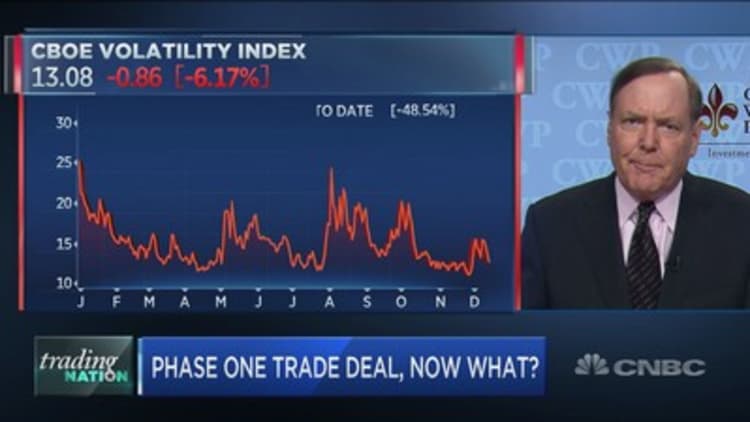
Stocks may be at highs, but investors could be acting overly cautious heading into 2020.
Even more than that, they are acting as though they are "scared to death," says Jeff Saut, chief investment strategist at Capital Wealth Planning. He says most of the investors he talks to fear what may come in the new year.
Saut, however, reassures them it's not yet time for the secular bull market to end.
"Secular bull markets tend to run 15 to 20 years. They're not interrupted by 20% to 30% declines," said Saut on CNBC's "Trading Nation" on Friday. "The 1949-1966 secular bull market had a 30% decline when you had the Jack Kennedy steel crisis in 1962. The 1982-2000 secular bull market had the 1987 crash, but the bull market went on for another 13 years, so I think we've got years left on the upside."
Stocks had a mixed day on Friday after the U.S. and China reached a phase one trade deal. The agreement includes some tariff relief, increased agricultural purchases, and structural change to intellectual property and technology issues.
Saut explained that while markets endured a back-and-forth on Friday, he's still bullish heading into the new year.
"The market has crossed over between plus and minus so often today the only way to make money was to erect a toll booth at even," said Saut. "You've got the seasonality tailwinds. … Central banks of the world are printing money and that's all you really need to know. ... Going into year-end, I think the market trades higher. … I think next year you can see between 3500 to 3600 on the S&P 500."
At the high end, that implies 13% upside from current levels.
Saut also pinpoints one section of the market he sees continuing to break out in the new year.
"You have what a technical analysis would call a golden cross, where the 50-day moving average crossed above the 200-day moving average on the Russell 2000 Small Cap index on Nov. 5th. The Small Caps have actually done pretty well since then, and it's not just the U.S. Small Caps. The European Small Caps had a similar golden cross on October 28th and they've done really well," said Saut.
The IWM ETF, which tracks the Russell 2000, is up 22% this year. The group began to participate more fully in the broader market rally this month.





